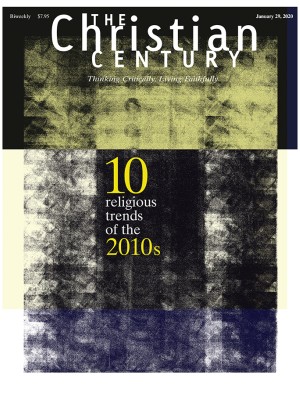February 9, Epiphany 5A (Isaiah 58:1–12; Psalm 112:1–10; 1 Corinthians 2:1–16; Matthew 5:13–20)
Putting flesh on the bones of justice
If last week’s texts were a call of hope, this week’s texts are a call to practical action.
The Isaiah text comes from part of the book commonly referred to as Third Isaiah, and our Micah reading from last week may well have been echoing it: “Is not this the fast I choose: to loose the bonds of injustice, to undo the thongs of the yoke, to let the oppressed go free, and to break every yoke?” The passage was likely written during the period of fasting following exile. The people are fasting, but life does not seem to be going well. In this text, Isaiah puts flesh on the bones of the concept of justice: we see him tackling just labor and employment practices, sharing bread, sheltering the homeless, clothing the naked, showing oneself to your own kin. These specifics are the “how” to last week’s “what.”
The true fast will be a life filled with acts of concrete justice and mercy that are practical—that touch upon basic human needs such as clothes, food, wages, and shelter. Isaiah is clear about this and instructs listeners to be as generous as possible, to share not sparingly but abundantly: “Pour yourself,” Isaiah writes, or more directly, “pour out yourself.” The text then moves into the conditional: if these things are done, then the Lord will say, “Here I am.” The connection between religious ritual (fasting) and acts of justice and mercy calls to mind the quote from John Chrysostom: “If you cannot find Christ in the beggar at the Church door, you will not find him in the chalice.”
Read our latest issue or browse back issues.
Not only will the Lord answer, but, if we are to believe Psalm 112, we will be truly happy—for we will be living with the knowledge of and due reverence to the Lord. Taken alongside the Isaiah text, the 1 Corinthians passage provides a reinforcement of attending to basic needs: “I did not come proclaiming the mystery of God to you in lofty words or wisdom” but rather with a dose of fear and “demonstration of the Spirit of power.” Empty rhetoric has no place here. Instead this is the time for the revelation of the Spirit, perhaps in the dialect of basic needs met. The old standards of defining weak and strong, capable and powerless, are passing away. God’s justice and the age of the Spirit are at hand.
And according to the Gospel text, any barrier to loosing the bonds of injustice seems entirely self-enforced. Salt and light, both commodities in Jesus’ time, sustain life—if you use them. Jesus’ tone seems to include a bit of humor: pure sodium chloride does not deteriorate, and surely one wouldn’t go through the effort of lighting a lamp just to hide it. The purpose of the commodity is in its use. Jesus seems to be saying that our lives operate in a similar way: as a valuable resource to be poured out and never hidden. Together with the Hebrew scripture and epistle texts, the Gospel seems to indicate that the only thing keeping us from attending to the basic needs of the world in practical ways is our own barriers, our failure to spend ourselves and our resources freely.
As Karoline Lewis points out, “It is not enough to know about God. As disciples, we have to be the activity of God in the World. We are called to live out our identity as salt and light.” Or as Bryant McGill once said, “We are here to spend ourselves.”
I am prone to preach this Gospel text in a way that aims to empower the congregation to rise up and act, but this may oversimplify the reality of life. Sometimes the worst things that we can imagine actually do happen, and when they do there are moments when we do indeed lose our saltiness and the light goes out. There are moments when we are in need of basic care, when we are not up to showing up and certainly could not imagine leading the revolution. While Matthew’s Gospel almost never ceases to hunger and thirst for righteousness, sometimes we are hungry and thirsty just to get through the day. In those moments, we need one another to nurse us back to life, singing songs when we cannot make a sound on our own behalf. When preaching revolution, sometimes we must also make room for the totality of human experience. Sometimes we need to let rage and sadness enter into our lexicon and lectionary and to sit with those inevitable realities as well.
When Methodist minister Lanecia Rouse Tinsley lost a child, she found solace in creating abstract visual art. She was working through a particularly challenging commission, and her local art supplier encouraged her, “Just remember that the canvas is big enough to hold all of your truth and all of your energy.” She has since wondered why she never heard that message in church about God: that God is big enough to hold all of our truth and all of our unknowing and grief and anger—all the times when salt loses its saltiness.
Even with knowledge of the Lord and living in accordance with God’s will, our hearts sometimes shrink, as the psalmist says. A generation may experience more than a whisper of hardship. What may we say to those in our midst in need of light and salt? How can a community be the church to people when the very life essence has gone out of them? The joy and challenge of a lectionary is coming back to the same texts time and again with new needs and situations, and therefore the need for new interpretation.





